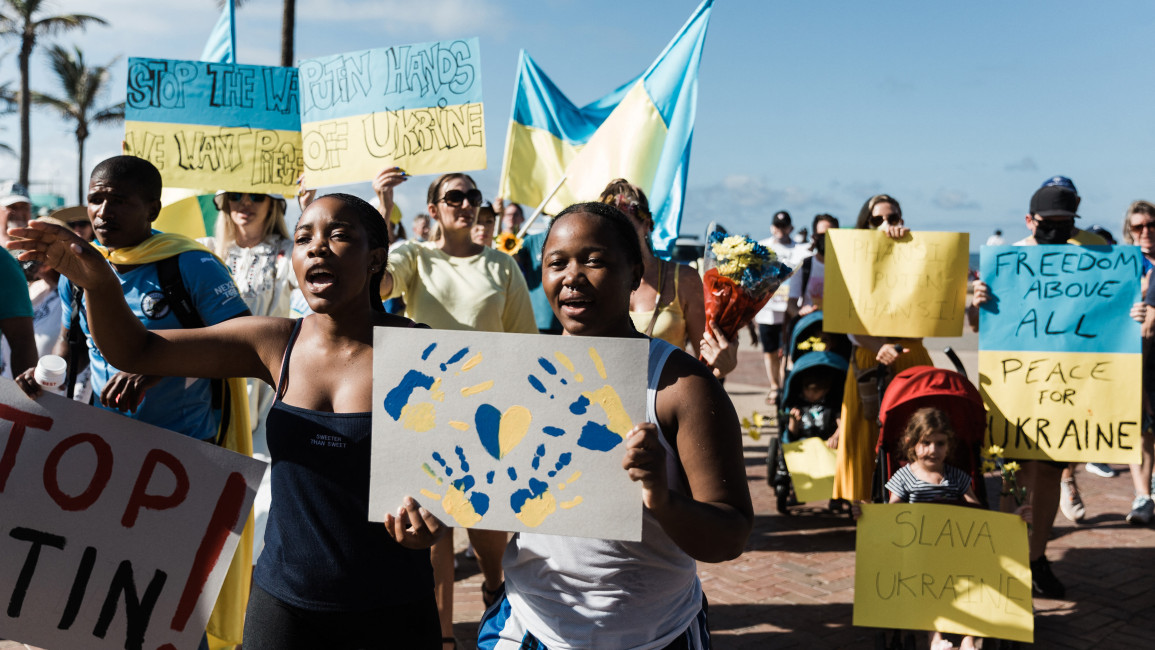
South Africa's failure to condemn Russia betrays Mandela's legacy of siding with the oppressed
A minute of silence for the painful position South Africa as tied itself into: a noble champion of Palestinian human rights, but strangely an endorser of Vladimir Putin’s bloody pummelling of Ukraine.
When Russia's carpet bombing of Ukraine got underway in February, South Africa remained silent as the entire African Union bravely went on the offensive, rebuking Putin for behaving like a “colonial bully”.
On Russia, South Africa’s foreign policy has been shambolic. It has veered from silence to confusion to reverence to, now, half-hearted pleas for a ceasefire.
When the Russian Army rained missiles on civilian targets in Kyiv and elsewhere in Ukraine, South Africa's government remained eerily silent. But South Africa’s public fury tripled. Gauging the fiery upset in public mood, the South African foreign ministry belatedly issued a statement tamely calling on Russia to cease its bombardment of Ukraine.
"On Russia, South Africa’s foreign policy has been shambolic. It has veered from silence to confusion to reverence to, now, half-hearted pleas for a ceasefire"
The next day, the drama started. Mr. Cyril Ramaphosa, the president of South Africa, was reportedly furious that his foreign minister had rebuked Russia. Immediately, on 27 February, South Africa's governing party, in crisis-managing mode, contacted the Russian embassy and “apologised”, adding to the diplomatic madness.
Pro-Palestine yet pro-Putin
South Africa is globally known for being one of the most outspoken nations and brave campaigners of Palestinian human rights. In 2021, a South African diplomat gained global applause when he courageously approached an Israeli policeman and intervened in a row over the collection of the olives harvest.
South Africa’s support for the dignity and rights of the Palestinian population is borne out of its own experience of shaking off 100 years of racist apartheid colonialism in 1994. Hence – South Africa’s foreign policy, personified by the sacrifices of Nelson Mandela, has always been expected to be moralist, in line with its historical experience.
Yet, in a departure from her expected ethical foreign policy, South Africa is a staunch supporter of Putin.
Obituaries & editorials praising Desmond Tutu's honesty and moral clarity on apartheid in South Africa have erased his committed support for Palestine. And almost as enduring as this support has been the smear campaigns against him
— The New Arab (@The_NewArab) January 1, 2022
✍ @Suraya_Dadoo https://t.co/EUJQ8cEUES
A trail of Russian money
There are a plethora of reasons why South Africa turns a blind eye to the war crimes actions of Putin in Ukraine.
Financial ties between then Soviet Russia and the African National Congress, the party of Nelson Mandela, which has governed South Africa since 1994, extend all the way back to the 70s, when the Soviet Union aided the ANC by providing arms, training, and funds to South Africa’s anti-Apartheid guerrillas.
Today, South Africa prefers to be tongue-tied when it comes to Russia because the ANC continues to see Russia as a cash cow when it comes to party financing. For example, the latest reports indicate that a diamond company owned by Viktor Vekselberg, an oligarch close to Putin, allegedly donated $330,000 to make sure South Africa's increasingly unpopular and broke ruling party excels in elections.
In return, South Africa tried to bulldoze public opposition and get Rosatom, a Russian company, to build an unwanted nuclear facility in South Africa.
Given the ANC’s close financial links and dependence on Russian financing, criticising Putin’s invasion of Ukraine could prove an existential threat to the party’s power.
The links of South African elites with Russia extend beyond finances. South Africa’s refrain from condemning Russia is also related to close medical ties between the two nations, as Moscow has served as a literal lifeline for South African leaders.
Time and again, South Africa’s rulers have been hospital guests of the Kremlin. In 2021, South Africa's deputy president spent almost three months receiving specialised treatment in a Moscow hospital, ostensibly to neutralise a poisoning ailment.
"Given the ANC’s close financial links and dependence on Russian financing, criticising Putin’s invasion of Ukraine could prove an existential threat to the party’s power"
In 2014, the then South Africa president, Mr. Jacob Zuma, couriered a jet to Moscow and was hospitalised again for food poisoning affliction. Today as bombs rain on Kyiv, astonishingly, Mr. Zuma is calling Putin, a “man of peace”.
“Moscow is the hospital of choice for South Africa’s rulers. They fear to be treated in ‘imperialist’ EU or US hospitals,” says Kudakwashe Magezi, a South African global affairs analyst.
“South Africa’s rulers owe their very health and longevity to Putin.”
As a further illustration of how Russia’s medical diplomacy intertwines with its leverage on South Africa’s foreign policy, in June, thousands marched in the capital Pretoria demanding that Russia’s Sputnik V vaccine be authorised. The march is suspected to be covertly funded by Russian operatives who want to intimidate South Africa's health regulators into approving Russia’s vaccine before completing clinical assessments.
Dangerous cavorting with Russia
On 2 March, South Africa doubled down and was one of the handful of UN member states that abstained from a resolution to condemn Russia’s atrocious violation of the UN Charter.
To its credit, South Africa has a commendable record of supporting the statehood goals and dignity of the Palestinian people, as well as other marginalised and oppressed people across the world.
However, if it maintains its misguided pro-Putin stance, South Africa’s human rights credentials will increasingly sound like empty rhetoric at best, and opportunistic at worst.
Ray Mwareya is the recipient of the 2016 UN Correspondents Association Prize and a global affairs journalist writing for The New Arab, Newsweek, Al Jazeera, and others.
Ashley Simango is a freelance journalist writing for The New Arab and Newsweek.
Have questions or comments? Email us at: editorial-english@alaraby.co.uk
Opinions expressed here are the author's own, and do not necessarily reflect those of their employer, or of The New Arab and its editorial board or staff.



